Evaluating Hong Kong's Early Childhood Education Policy (ECEC)
VerifiedAdded on 2023/06/12
|19
|5379
|76
Report
AI Summary
This report provides a comprehensive analysis of the Early Childhood Education (ECEC) policy in Hong Kong, focusing on the status of free kindergarten education. It examines key issues related to the implementation of free kindergarten education, theoretical analyses of Hong Kong-based policies using Bronfenbrenner’s ecological systems theory and Foucault’s theory, and the influences shaping the ECEC policy. The report also offers a critical understanding of ECEC policy developments, their impact on children, families, and practitioners, and discusses future policy directions. The study highlights the government's efforts to provide quality education and address inequalities in pre-primary education, while also noting challenges such as financial constraints and socio-cultural disparities. The overarching goal is to ensure a sustainable and equitable education system that fosters lifelong development and prepares children for future learning.
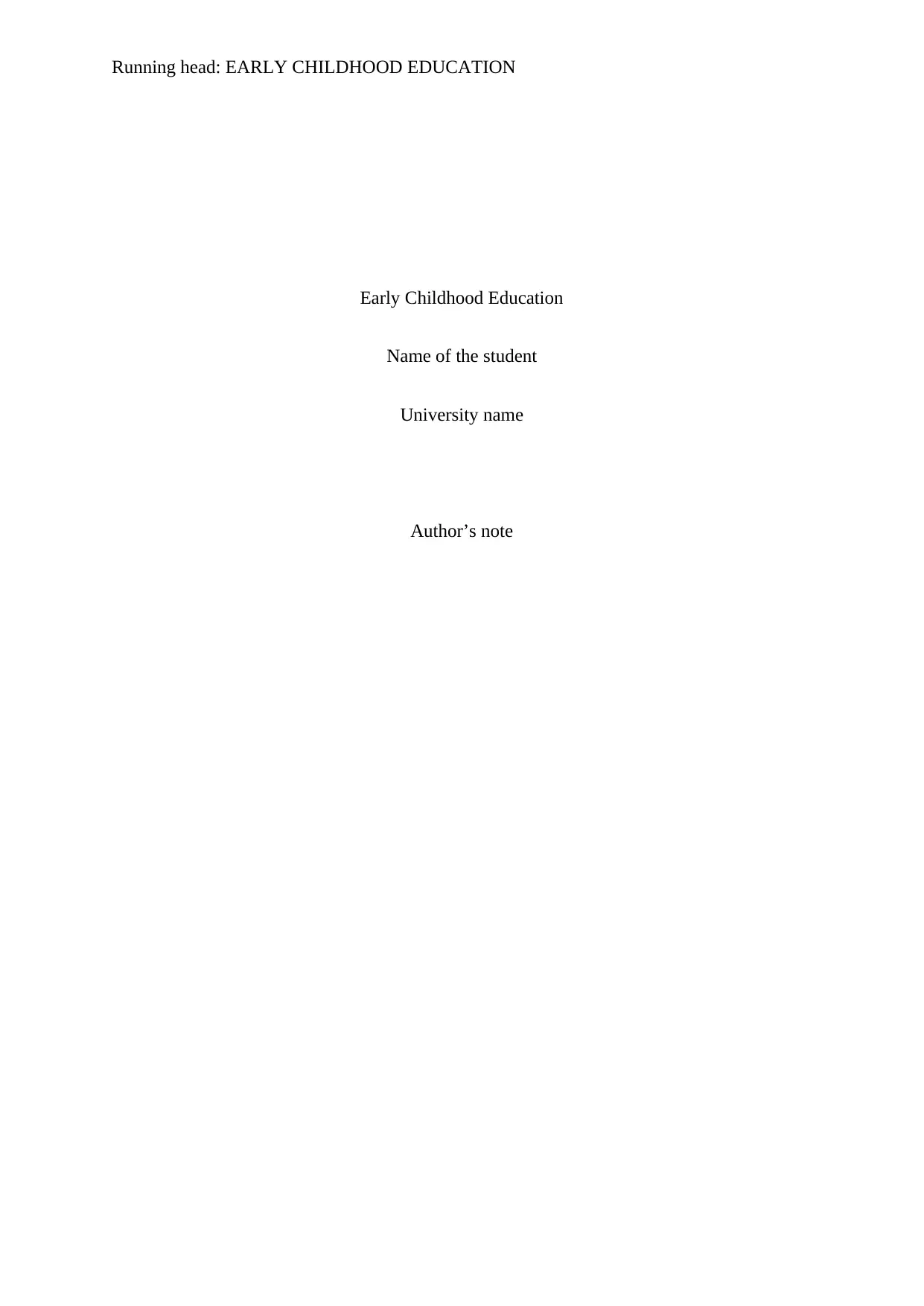
Running head: EARLY CHILDHOOD EDUCATION
Early Childhood Education
Name of the student
University name
Author’s note
Early Childhood Education
Name of the student
University name
Author’s note
Paraphrase This Document
Need a fresh take? Get an instant paraphrase of this document with our AI Paraphraser
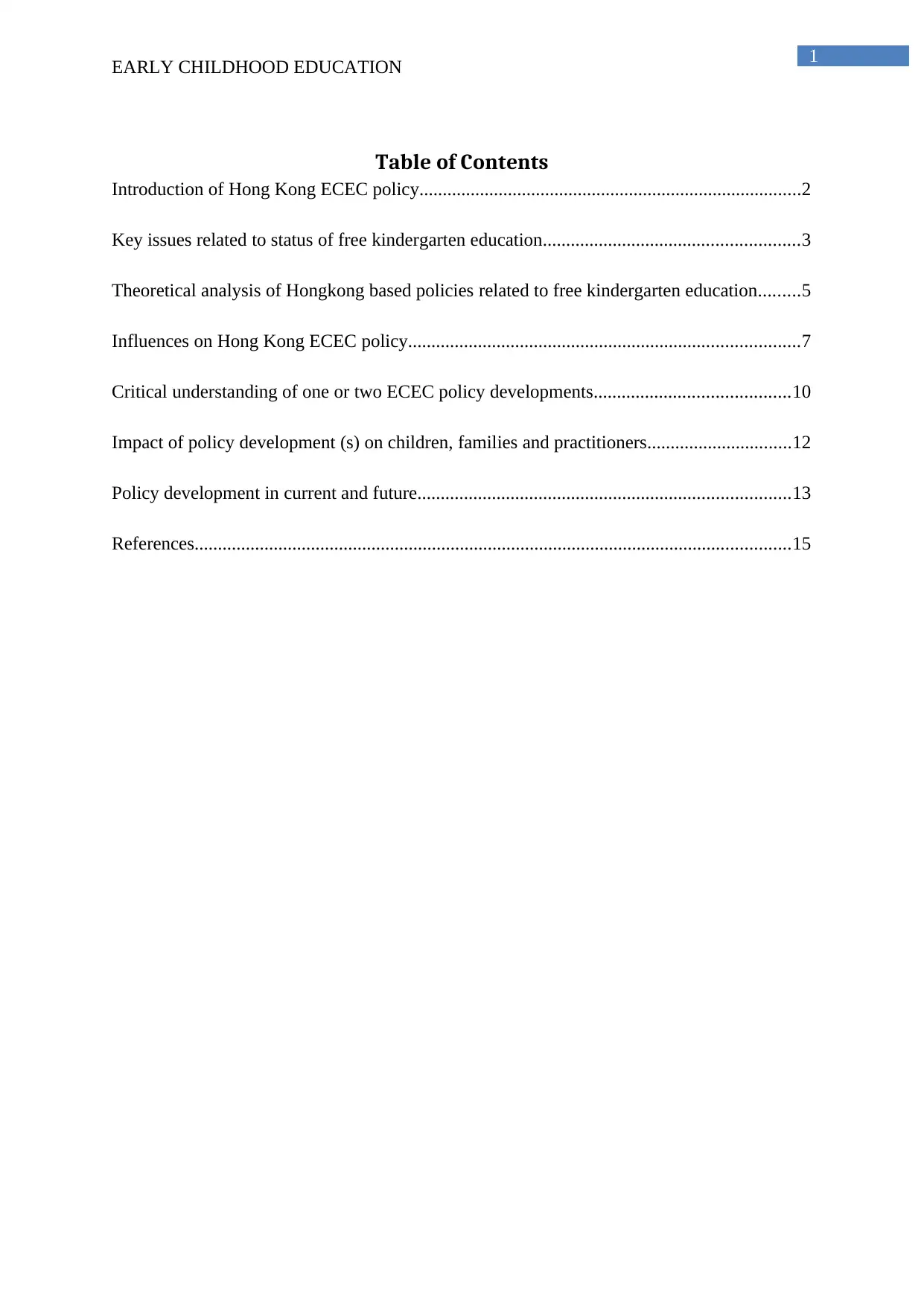
1
EARLY CHILDHOOD EDUCATION
Table of Contents
Introduction of Hong Kong ECEC policy..................................................................................2
Key issues related to status of free kindergarten education.......................................................3
Theoretical analysis of Hongkong based policies related to free kindergarten education.........5
Influences on Hong Kong ECEC policy....................................................................................7
Critical understanding of one or two ECEC policy developments..........................................10
Impact of policy development (s) on children, families and practitioners...............................12
Policy development in current and future................................................................................13
References................................................................................................................................15
EARLY CHILDHOOD EDUCATION
Table of Contents
Introduction of Hong Kong ECEC policy..................................................................................2
Key issues related to status of free kindergarten education.......................................................3
Theoretical analysis of Hongkong based policies related to free kindergarten education.........5
Influences on Hong Kong ECEC policy....................................................................................7
Critical understanding of one or two ECEC policy developments..........................................10
Impact of policy development (s) on children, families and practitioners...............................12
Policy development in current and future................................................................................13
References................................................................................................................................15
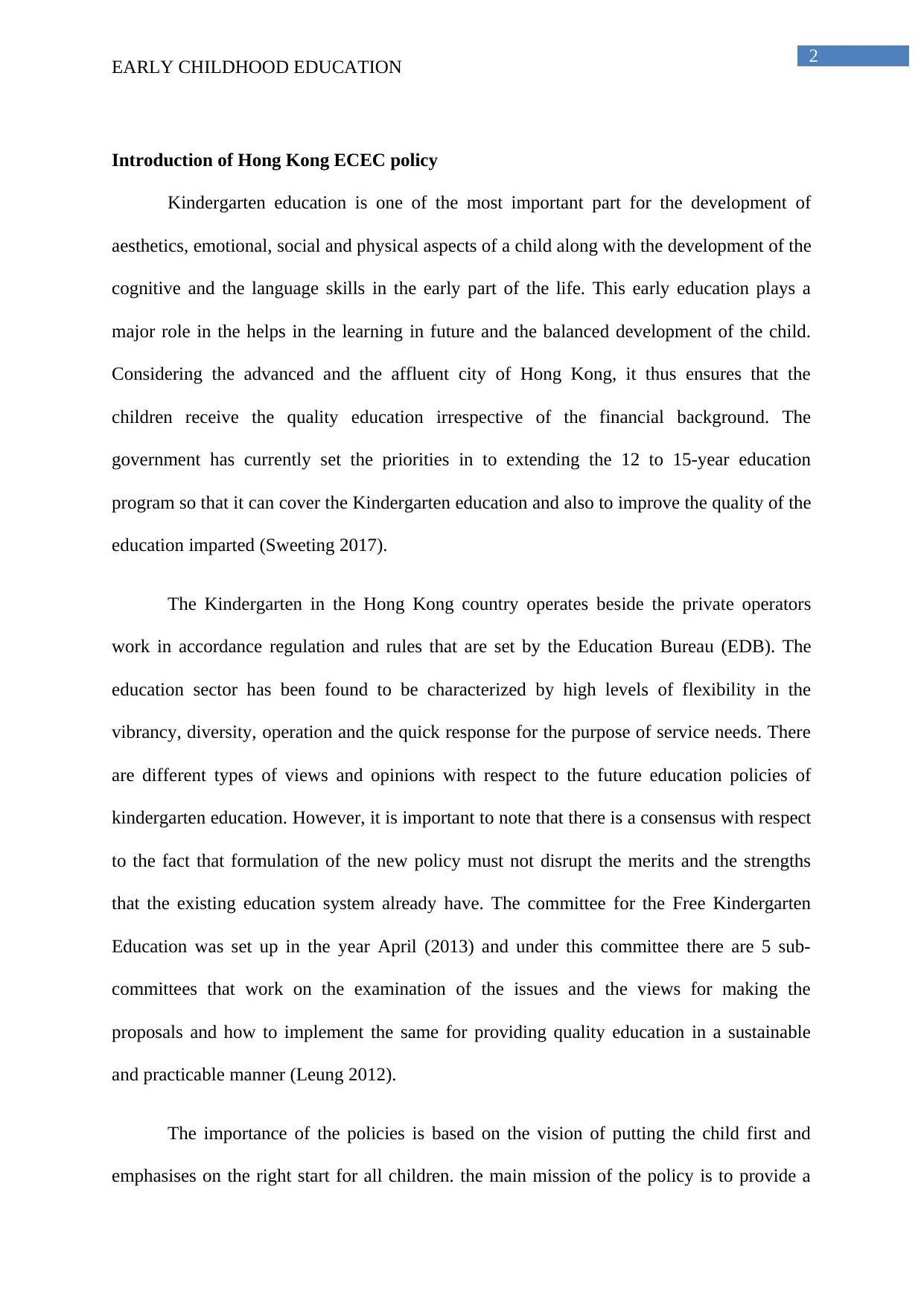
2
EARLY CHILDHOOD EDUCATION
Introduction of Hong Kong ECEC policy
Kindergarten education is one of the most important part for the development of
aesthetics, emotional, social and physical aspects of a child along with the development of the
cognitive and the language skills in the early part of the life. This early education plays a
major role in the helps in the learning in future and the balanced development of the child.
Considering the advanced and the affluent city of Hong Kong, it thus ensures that the
children receive the quality education irrespective of the financial background. The
government has currently set the priorities in to extending the 12 to 15-year education
program so that it can cover the Kindergarten education and also to improve the quality of the
education imparted (Sweeting 2017).
The Kindergarten in the Hong Kong country operates beside the private operators
work in accordance regulation and rules that are set by the Education Bureau (EDB). The
education sector has been found to be characterized by high levels of flexibility in the
vibrancy, diversity, operation and the quick response for the purpose of service needs. There
are different types of views and opinions with respect to the future education policies of
kindergarten education. However, it is important to note that there is a consensus with respect
to the fact that formulation of the new policy must not disrupt the merits and the strengths
that the existing education system already have. The committee for the Free Kindergarten
Education was set up in the year April (2013) and under this committee there are 5 sub-
committees that work on the examination of the issues and the views for making the
proposals and how to implement the same for providing quality education in a sustainable
and practicable manner (Leung 2012).
The importance of the policies is based on the vision of putting the child first and
emphasises on the right start for all children. the main mission of the policy is to provide a
EARLY CHILDHOOD EDUCATION
Introduction of Hong Kong ECEC policy
Kindergarten education is one of the most important part for the development of
aesthetics, emotional, social and physical aspects of a child along with the development of the
cognitive and the language skills in the early part of the life. This early education plays a
major role in the helps in the learning in future and the balanced development of the child.
Considering the advanced and the affluent city of Hong Kong, it thus ensures that the
children receive the quality education irrespective of the financial background. The
government has currently set the priorities in to extending the 12 to 15-year education
program so that it can cover the Kindergarten education and also to improve the quality of the
education imparted (Sweeting 2017).
The Kindergarten in the Hong Kong country operates beside the private operators
work in accordance regulation and rules that are set by the Education Bureau (EDB). The
education sector has been found to be characterized by high levels of flexibility in the
vibrancy, diversity, operation and the quick response for the purpose of service needs. There
are different types of views and opinions with respect to the future education policies of
kindergarten education. However, it is important to note that there is a consensus with respect
to the fact that formulation of the new policy must not disrupt the merits and the strengths
that the existing education system already have. The committee for the Free Kindergarten
Education was set up in the year April (2013) and under this committee there are 5 sub-
committees that work on the examination of the issues and the views for making the
proposals and how to implement the same for providing quality education in a sustainable
and practicable manner (Leung 2012).
The importance of the policies is based on the vision of putting the child first and
emphasises on the right start for all children. the main mission of the policy is to provide a
⊘ This is a preview!⊘
Do you want full access?
Subscribe today to unlock all pages.

Trusted by 1+ million students worldwide
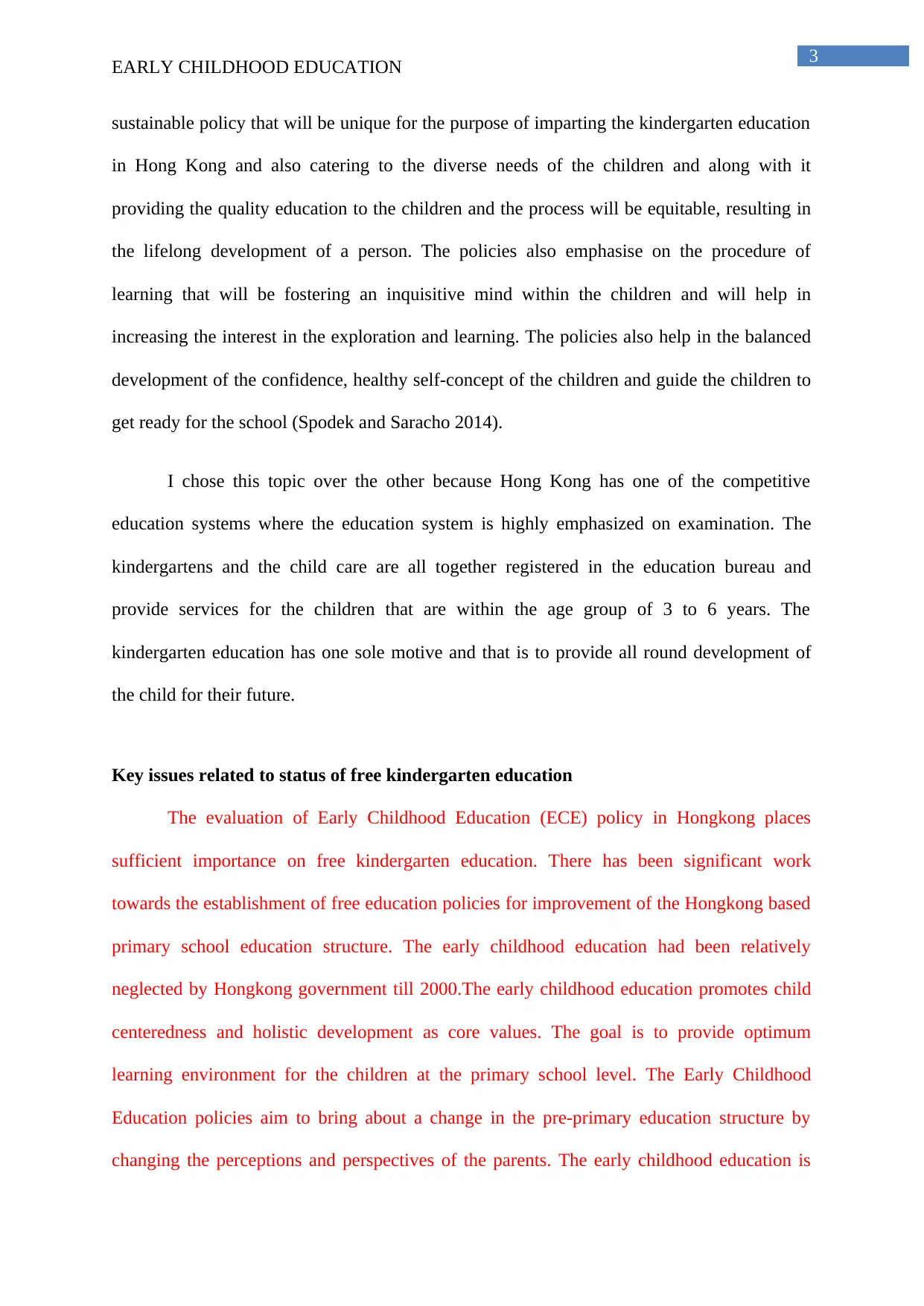
3
EARLY CHILDHOOD EDUCATION
sustainable policy that will be unique for the purpose of imparting the kindergarten education
in Hong Kong and also catering to the diverse needs of the children and along with it
providing the quality education to the children and the process will be equitable, resulting in
the lifelong development of a person. The policies also emphasise on the procedure of
learning that will be fostering an inquisitive mind within the children and will help in
increasing the interest in the exploration and learning. The policies also help in the balanced
development of the confidence, healthy self-concept of the children and guide the children to
get ready for the school (Spodek and Saracho 2014).
I chose this topic over the other because Hong Kong has one of the competitive
education systems where the education system is highly emphasized on examination. The
kindergartens and the child care are all together registered in the education bureau and
provide services for the children that are within the age group of 3 to 6 years. The
kindergarten education has one sole motive and that is to provide all round development of
the child for their future.
Key issues related to status of free kindergarten education
The evaluation of Early Childhood Education (ECE) policy in Hongkong places
sufficient importance on free kindergarten education. There has been significant work
towards the establishment of free education policies for improvement of the Hongkong based
primary school education structure. The early childhood education had been relatively
neglected by Hongkong government till 2000.The early childhood education promotes child
centeredness and holistic development as core values. The goal is to provide optimum
learning environment for the children at the primary school level. The Early Childhood
Education policies aim to bring about a change in the pre-primary education structure by
changing the perceptions and perspectives of the parents. The early childhood education is
EARLY CHILDHOOD EDUCATION
sustainable policy that will be unique for the purpose of imparting the kindergarten education
in Hong Kong and also catering to the diverse needs of the children and along with it
providing the quality education to the children and the process will be equitable, resulting in
the lifelong development of a person. The policies also emphasise on the procedure of
learning that will be fostering an inquisitive mind within the children and will help in
increasing the interest in the exploration and learning. The policies also help in the balanced
development of the confidence, healthy self-concept of the children and guide the children to
get ready for the school (Spodek and Saracho 2014).
I chose this topic over the other because Hong Kong has one of the competitive
education systems where the education system is highly emphasized on examination. The
kindergartens and the child care are all together registered in the education bureau and
provide services for the children that are within the age group of 3 to 6 years. The
kindergarten education has one sole motive and that is to provide all round development of
the child for their future.
Key issues related to status of free kindergarten education
The evaluation of Early Childhood Education (ECE) policy in Hongkong places
sufficient importance on free kindergarten education. There has been significant work
towards the establishment of free education policies for improvement of the Hongkong based
primary school education structure. The early childhood education had been relatively
neglected by Hongkong government till 2000.The early childhood education promotes child
centeredness and holistic development as core values. The goal is to provide optimum
learning environment for the children at the primary school level. The Early Childhood
Education policies aim to bring about a change in the pre-primary education structure by
changing the perceptions and perspectives of the parents. The early childhood education is
Paraphrase This Document
Need a fresh take? Get an instant paraphrase of this document with our AI Paraphraser
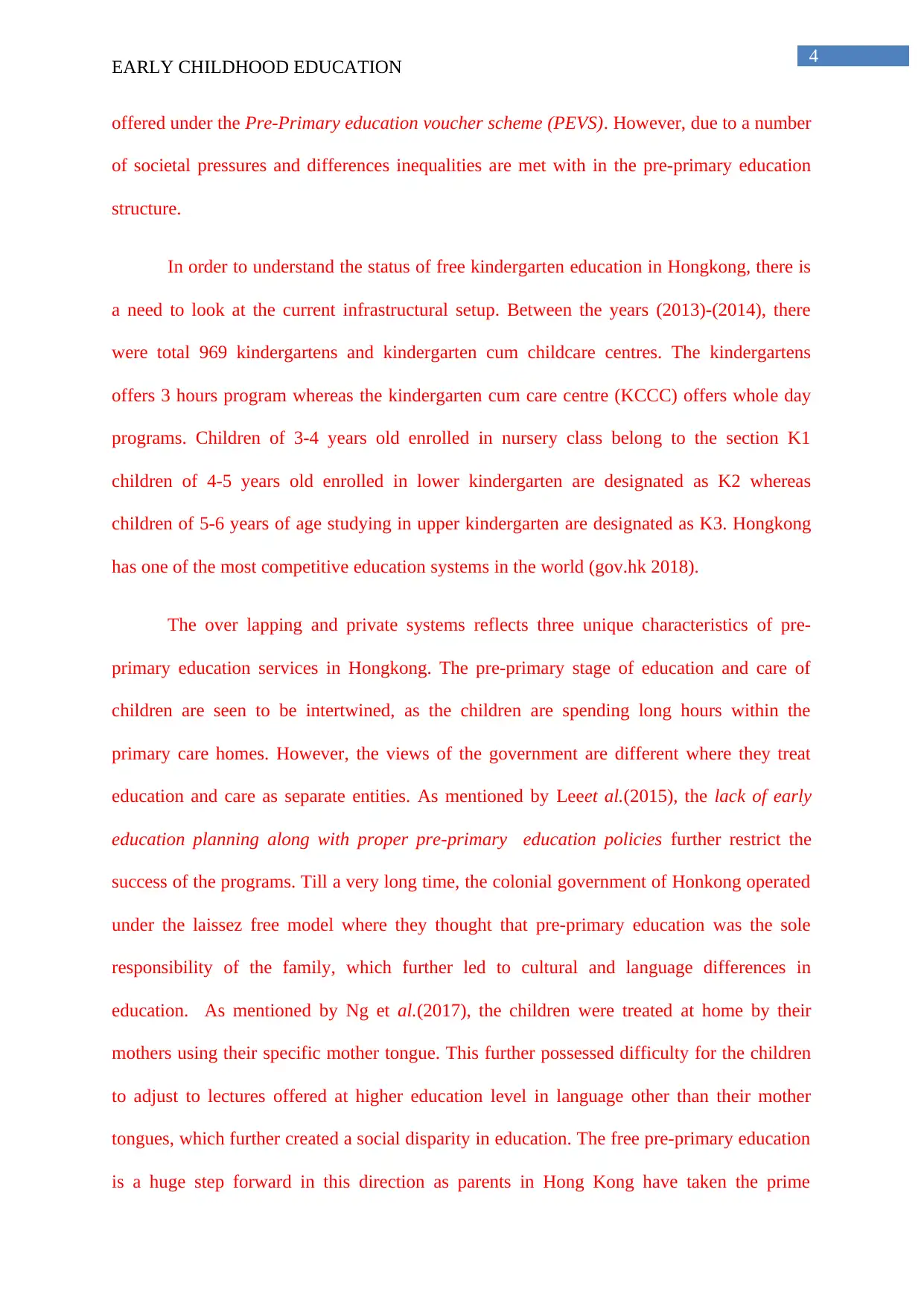
4
EARLY CHILDHOOD EDUCATION
offered under the Pre-Primary education voucher scheme (PEVS). However, due to a number
of societal pressures and differences inequalities are met with in the pre-primary education
structure.
In order to understand the status of free kindergarten education in Hongkong, there is
a need to look at the current infrastructural setup. Between the years (2013)-(2014), there
were total 969 kindergartens and kindergarten cum childcare centres. The kindergartens
offers 3 hours program whereas the kindergarten cum care centre (KCCC) offers whole day
programs. Children of 3-4 years old enrolled in nursery class belong to the section K1
children of 4-5 years old enrolled in lower kindergarten are designated as K2 whereas
children of 5-6 years of age studying in upper kindergarten are designated as K3. Hongkong
has one of the most competitive education systems in the world (gov.hk 2018).
The over lapping and private systems reflects three unique characteristics of pre-
primary education services in Hongkong. The pre-primary stage of education and care of
children are seen to be intertwined, as the children are spending long hours within the
primary care homes. However, the views of the government are different where they treat
education and care as separate entities. As mentioned by Leeet al.(2015), the lack of early
education planning along with proper pre-primary education policies further restrict the
success of the programs. Till a very long time, the colonial government of Honkong operated
under the laissez free model where they thought that pre-primary education was the sole
responsibility of the family, which further led to cultural and language differences in
education. As mentioned by Ng et al.(2017), the children were treated at home by their
mothers using their specific mother tongue. This further possessed difficulty for the children
to adjust to lectures offered at higher education level in language other than their mother
tongues, which further created a social disparity in education. The free pre-primary education
is a huge step forward in this direction as parents in Hong Kong have taken the prime
EARLY CHILDHOOD EDUCATION
offered under the Pre-Primary education voucher scheme (PEVS). However, due to a number
of societal pressures and differences inequalities are met with in the pre-primary education
structure.
In order to understand the status of free kindergarten education in Hongkong, there is
a need to look at the current infrastructural setup. Between the years (2013)-(2014), there
were total 969 kindergartens and kindergarten cum childcare centres. The kindergartens
offers 3 hours program whereas the kindergarten cum care centre (KCCC) offers whole day
programs. Children of 3-4 years old enrolled in nursery class belong to the section K1
children of 4-5 years old enrolled in lower kindergarten are designated as K2 whereas
children of 5-6 years of age studying in upper kindergarten are designated as K3. Hongkong
has one of the most competitive education systems in the world (gov.hk 2018).
The over lapping and private systems reflects three unique characteristics of pre-
primary education services in Hongkong. The pre-primary stage of education and care of
children are seen to be intertwined, as the children are spending long hours within the
primary care homes. However, the views of the government are different where they treat
education and care as separate entities. As mentioned by Leeet al.(2015), the lack of early
education planning along with proper pre-primary education policies further restrict the
success of the programs. Till a very long time, the colonial government of Honkong operated
under the laissez free model where they thought that pre-primary education was the sole
responsibility of the family, which further led to cultural and language differences in
education. As mentioned by Ng et al.(2017), the children were treated at home by their
mothers using their specific mother tongue. This further possessed difficulty for the children
to adjust to lectures offered at higher education level in language other than their mother
tongues, which further created a social disparity in education. The free pre-primary education
is a huge step forward in this direction as parents in Hong Kong have taken the prime
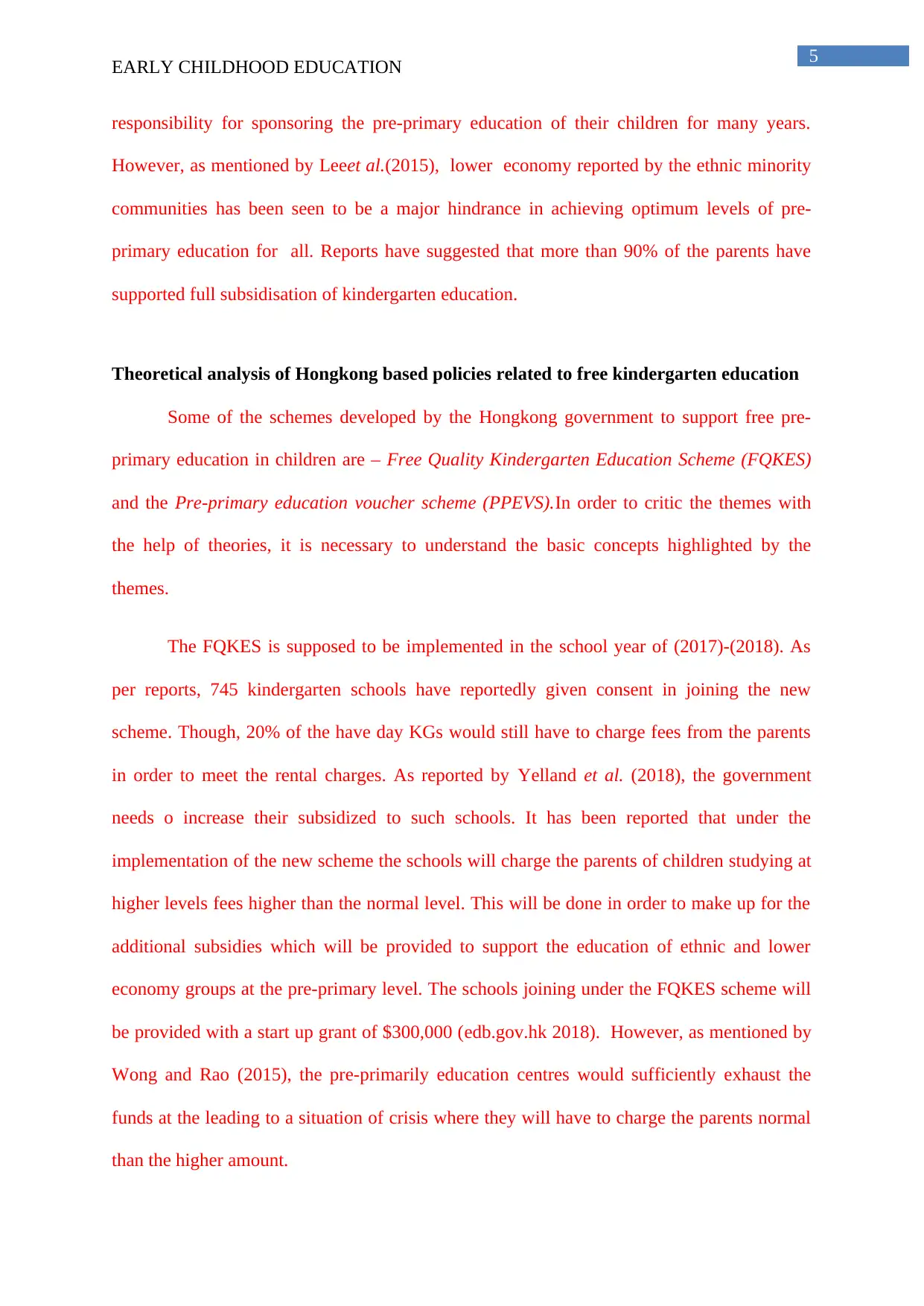
5
EARLY CHILDHOOD EDUCATION
responsibility for sponsoring the pre-primary education of their children for many years.
However, as mentioned by Leeet al.(2015), lower economy reported by the ethnic minority
communities has been seen to be a major hindrance in achieving optimum levels of pre-
primary education for all. Reports have suggested that more than 90% of the parents have
supported full subsidisation of kindergarten education.
Theoretical analysis of Hongkong based policies related to free kindergarten education
Some of the schemes developed by the Hongkong government to support free pre-
primary education in children are – Free Quality Kindergarten Education Scheme (FQKES)
and the Pre-primary education voucher scheme (PPEVS).In order to critic the themes with
the help of theories, it is necessary to understand the basic concepts highlighted by the
themes.
The FQKES is supposed to be implemented in the school year of (2017)-(2018). As
per reports, 745 kindergarten schools have reportedly given consent in joining the new
scheme. Though, 20% of the have day KGs would still have to charge fees from the parents
in order to meet the rental charges. As reported by Yelland et al. (2018), the government
needs o increase their subsidized to such schools. It has been reported that under the
implementation of the new scheme the schools will charge the parents of children studying at
higher levels fees higher than the normal level. This will be done in order to make up for the
additional subsidies which will be provided to support the education of ethnic and lower
economy groups at the pre-primary level. The schools joining under the FQKES scheme will
be provided with a start up grant of $300,000 (edb.gov.hk 2018). However, as mentioned by
Wong and Rao (2015), the pre-primarily education centres would sufficiently exhaust the
funds at the leading to a situation of crisis where they will have to charge the parents normal
than the higher amount.
EARLY CHILDHOOD EDUCATION
responsibility for sponsoring the pre-primary education of their children for many years.
However, as mentioned by Leeet al.(2015), lower economy reported by the ethnic minority
communities has been seen to be a major hindrance in achieving optimum levels of pre-
primary education for all. Reports have suggested that more than 90% of the parents have
supported full subsidisation of kindergarten education.
Theoretical analysis of Hongkong based policies related to free kindergarten education
Some of the schemes developed by the Hongkong government to support free pre-
primary education in children are – Free Quality Kindergarten Education Scheme (FQKES)
and the Pre-primary education voucher scheme (PPEVS).In order to critic the themes with
the help of theories, it is necessary to understand the basic concepts highlighted by the
themes.
The FQKES is supposed to be implemented in the school year of (2017)-(2018). As
per reports, 745 kindergarten schools have reportedly given consent in joining the new
scheme. Though, 20% of the have day KGs would still have to charge fees from the parents
in order to meet the rental charges. As reported by Yelland et al. (2018), the government
needs o increase their subsidized to such schools. It has been reported that under the
implementation of the new scheme the schools will charge the parents of children studying at
higher levels fees higher than the normal level. This will be done in order to make up for the
additional subsidies which will be provided to support the education of ethnic and lower
economy groups at the pre-primary level. The schools joining under the FQKES scheme will
be provided with a start up grant of $300,000 (edb.gov.hk 2018). However, as mentioned by
Wong and Rao (2015), the pre-primarily education centres would sufficiently exhaust the
funds at the leading to a situation of crisis where they will have to charge the parents normal
than the higher amount.
⊘ This is a preview!⊘
Do you want full access?
Subscribe today to unlock all pages.

Trusted by 1+ million students worldwide
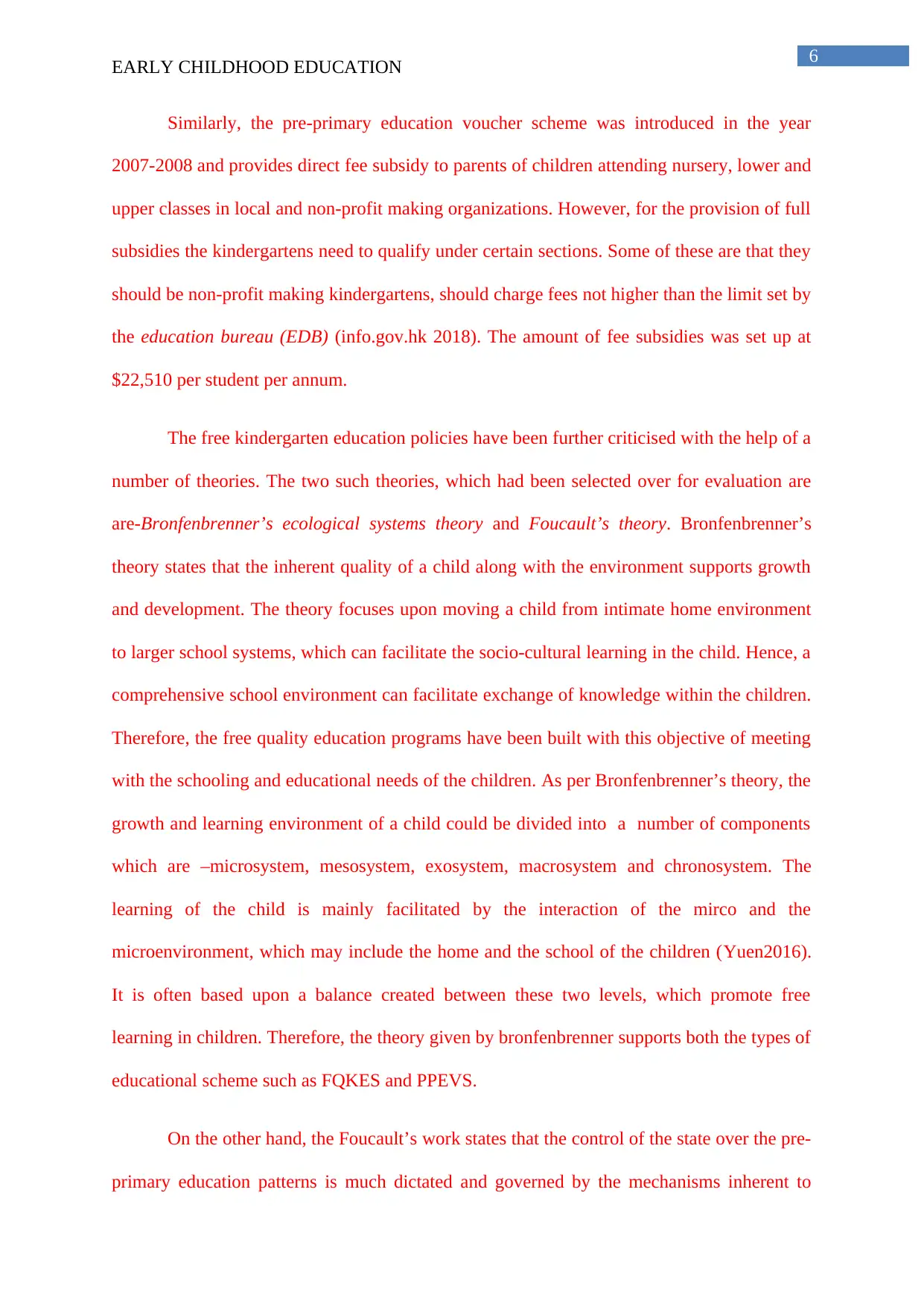
6
EARLY CHILDHOOD EDUCATION
Similarly, the pre-primary education voucher scheme was introduced in the year
2007-2008 and provides direct fee subsidy to parents of children attending nursery, lower and
upper classes in local and non-profit making organizations. However, for the provision of full
subsidies the kindergartens need to qualify under certain sections. Some of these are that they
should be non-profit making kindergartens, should charge fees not higher than the limit set by
the education bureau (EDB) (info.gov.hk 2018). The amount of fee subsidies was set up at
$22,510 per student per annum.
The free kindergarten education policies have been further criticised with the help of a
number of theories. The two such theories, which had been selected over for evaluation are
are-Bronfenbrenner’s ecological systems theory and Foucault’s theory. Bronfenbrenner’s
theory states that the inherent quality of a child along with the environment supports growth
and development. The theory focuses upon moving a child from intimate home environment
to larger school systems, which can facilitate the socio-cultural learning in the child. Hence, a
comprehensive school environment can facilitate exchange of knowledge within the children.
Therefore, the free quality education programs have been built with this objective of meeting
with the schooling and educational needs of the children. As per Bronfenbrenner’s theory, the
growth and learning environment of a child could be divided into a number of components
which are –microsystem, mesosystem, exosystem, macrosystem and chronosystem. The
learning of the child is mainly facilitated by the interaction of the mirco and the
microenvironment, which may include the home and the school of the children (Yuen2016).
It is often based upon a balance created between these two levels, which promote free
learning in children. Therefore, the theory given by bronfenbrenner supports both the types of
educational scheme such as FQKES and PPEVS.
On the other hand, the Foucault’s work states that the control of the state over the pre-
primary education patterns is much dictated and governed by the mechanisms inherent to
EARLY CHILDHOOD EDUCATION
Similarly, the pre-primary education voucher scheme was introduced in the year
2007-2008 and provides direct fee subsidy to parents of children attending nursery, lower and
upper classes in local and non-profit making organizations. However, for the provision of full
subsidies the kindergartens need to qualify under certain sections. Some of these are that they
should be non-profit making kindergartens, should charge fees not higher than the limit set by
the education bureau (EDB) (info.gov.hk 2018). The amount of fee subsidies was set up at
$22,510 per student per annum.
The free kindergarten education policies have been further criticised with the help of a
number of theories. The two such theories, which had been selected over for evaluation are
are-Bronfenbrenner’s ecological systems theory and Foucault’s theory. Bronfenbrenner’s
theory states that the inherent quality of a child along with the environment supports growth
and development. The theory focuses upon moving a child from intimate home environment
to larger school systems, which can facilitate the socio-cultural learning in the child. Hence, a
comprehensive school environment can facilitate exchange of knowledge within the children.
Therefore, the free quality education programs have been built with this objective of meeting
with the schooling and educational needs of the children. As per Bronfenbrenner’s theory, the
growth and learning environment of a child could be divided into a number of components
which are –microsystem, mesosystem, exosystem, macrosystem and chronosystem. The
learning of the child is mainly facilitated by the interaction of the mirco and the
microenvironment, which may include the home and the school of the children (Yuen2016).
It is often based upon a balance created between these two levels, which promote free
learning in children. Therefore, the theory given by bronfenbrenner supports both the types of
educational scheme such as FQKES and PPEVS.
On the other hand, the Foucault’s work states that the control of the state over the pre-
primary education patterns is much dictated and governed by the mechanisms inherent to
Paraphrase This Document
Need a fresh take? Get an instant paraphrase of this document with our AI Paraphraser
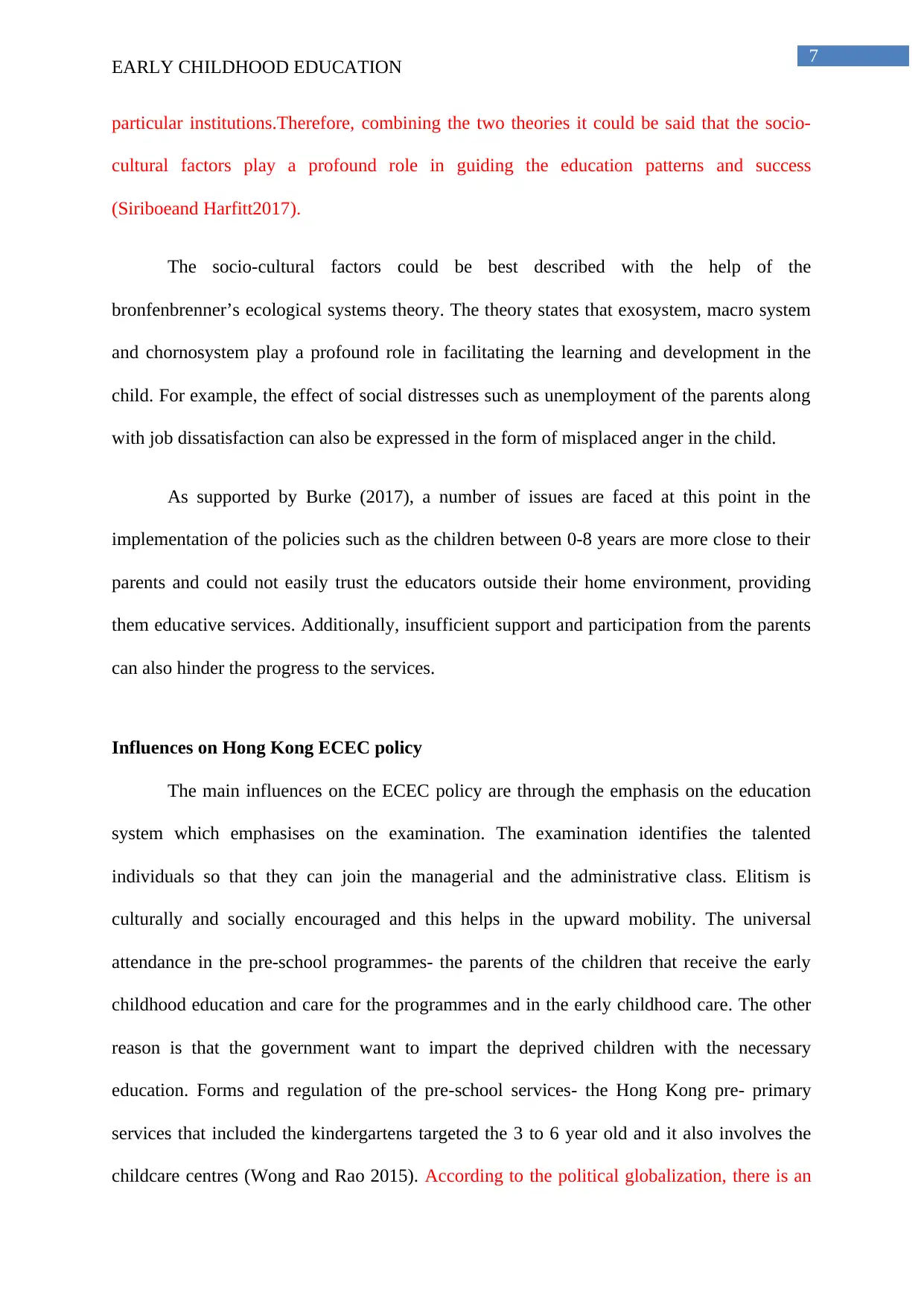
7
EARLY CHILDHOOD EDUCATION
particular institutions.Therefore, combining the two theories it could be said that the socio-
cultural factors play a profound role in guiding the education patterns and success
(Siriboeand Harfitt2017).
The socio-cultural factors could be best described with the help of the
bronfenbrenner’s ecological systems theory. The theory states that exosystem, macro system
and chornosystem play a profound role in facilitating the learning and development in the
child. For example, the effect of social distresses such as unemployment of the parents along
with job dissatisfaction can also be expressed in the form of misplaced anger in the child.
As supported by Burke (2017), a number of issues are faced at this point in the
implementation of the policies such as the children between 0-8 years are more close to their
parents and could not easily trust the educators outside their home environment, providing
them educative services. Additionally, insufficient support and participation from the parents
can also hinder the progress to the services.
Influences on Hong Kong ECEC policy
The main influences on the ECEC policy are through the emphasis on the education
system which emphasises on the examination. The examination identifies the talented
individuals so that they can join the managerial and the administrative class. Elitism is
culturally and socially encouraged and this helps in the upward mobility. The universal
attendance in the pre-school programmes- the parents of the children that receive the early
childhood education and care for the programmes and in the early childhood care. The other
reason is that the government want to impart the deprived children with the necessary
education. Forms and regulation of the pre-school services- the Hong Kong pre- primary
services that included the kindergartens targeted the 3 to 6 year old and it also involves the
childcare centres (Wong and Rao 2015). According to the political globalization, there is an
EARLY CHILDHOOD EDUCATION
particular institutions.Therefore, combining the two theories it could be said that the socio-
cultural factors play a profound role in guiding the education patterns and success
(Siriboeand Harfitt2017).
The socio-cultural factors could be best described with the help of the
bronfenbrenner’s ecological systems theory. The theory states that exosystem, macro system
and chornosystem play a profound role in facilitating the learning and development in the
child. For example, the effect of social distresses such as unemployment of the parents along
with job dissatisfaction can also be expressed in the form of misplaced anger in the child.
As supported by Burke (2017), a number of issues are faced at this point in the
implementation of the policies such as the children between 0-8 years are more close to their
parents and could not easily trust the educators outside their home environment, providing
them educative services. Additionally, insufficient support and participation from the parents
can also hinder the progress to the services.
Influences on Hong Kong ECEC policy
The main influences on the ECEC policy are through the emphasis on the education
system which emphasises on the examination. The examination identifies the talented
individuals so that they can join the managerial and the administrative class. Elitism is
culturally and socially encouraged and this helps in the upward mobility. The universal
attendance in the pre-school programmes- the parents of the children that receive the early
childhood education and care for the programmes and in the early childhood care. The other
reason is that the government want to impart the deprived children with the necessary
education. Forms and regulation of the pre-school services- the Hong Kong pre- primary
services that included the kindergartens targeted the 3 to 6 year old and it also involves the
childcare centres (Wong and Rao 2015). According to the political globalization, there is an
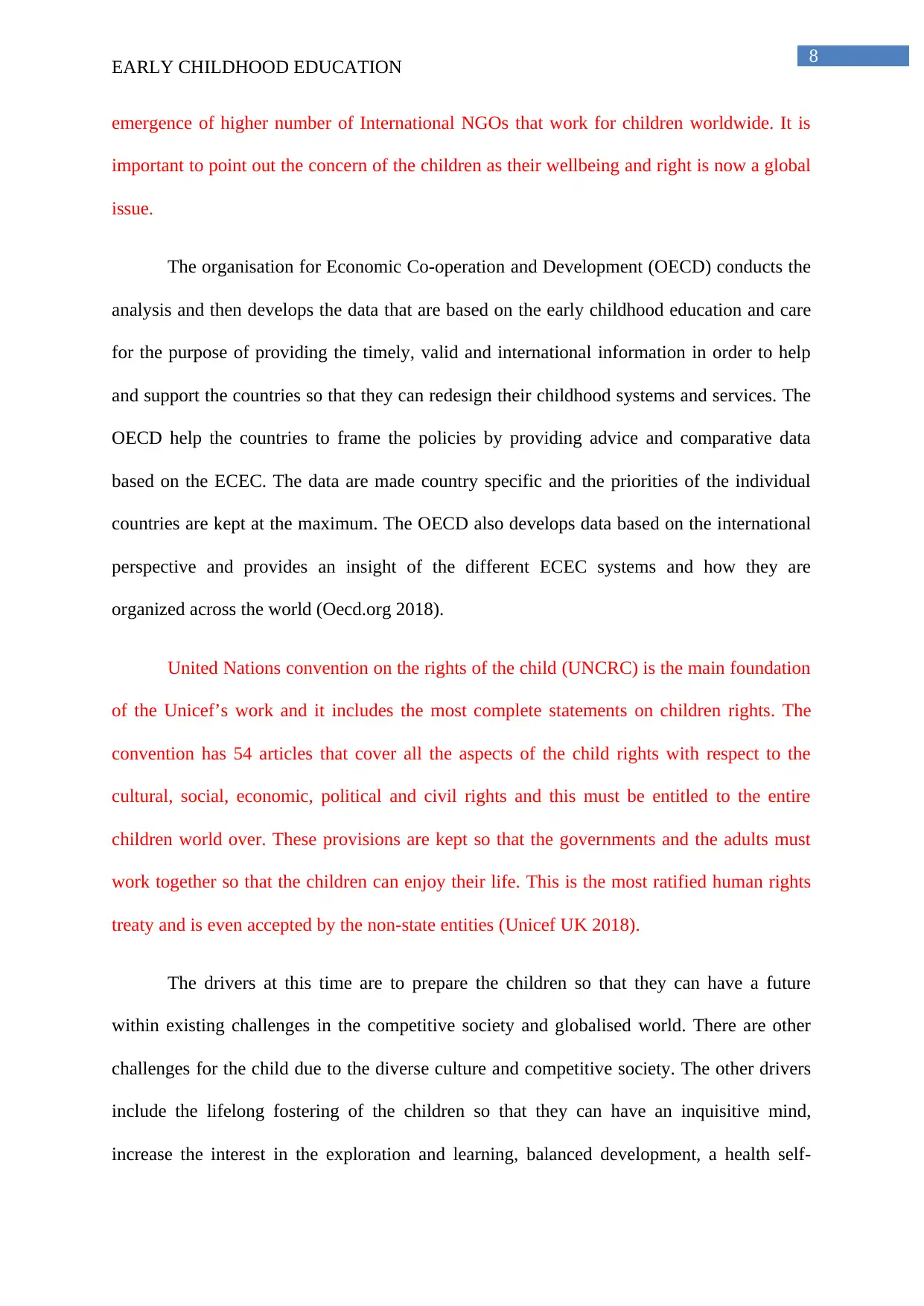
8
EARLY CHILDHOOD EDUCATION
emergence of higher number of International NGOs that work for children worldwide. It is
important to point out the concern of the children as their wellbeing and right is now a global
issue.
The organisation for Economic Co-operation and Development (OECD) conducts the
analysis and then develops the data that are based on the early childhood education and care
for the purpose of providing the timely, valid and international information in order to help
and support the countries so that they can redesign their childhood systems and services. The
OECD help the countries to frame the policies by providing advice and comparative data
based on the ECEC. The data are made country specific and the priorities of the individual
countries are kept at the maximum. The OECD also develops data based on the international
perspective and provides an insight of the different ECEC systems and how they are
organized across the world (Oecd.org 2018).
United Nations convention on the rights of the child (UNCRC) is the main foundation
of the Unicef’s work and it includes the most complete statements on children rights. The
convention has 54 articles that cover all the aspects of the child rights with respect to the
cultural, social, economic, political and civil rights and this must be entitled to the entire
children world over. These provisions are kept so that the governments and the adults must
work together so that the children can enjoy their life. This is the most ratified human rights
treaty and is even accepted by the non-state entities (Unicef UK 2018).
The drivers at this time are to prepare the children so that they can have a future
within existing challenges in the competitive society and globalised world. There are other
challenges for the child due to the diverse culture and competitive society. The other drivers
include the lifelong fostering of the children so that they can have an inquisitive mind,
increase the interest in the exploration and learning, balanced development, a health self-
EARLY CHILDHOOD EDUCATION
emergence of higher number of International NGOs that work for children worldwide. It is
important to point out the concern of the children as their wellbeing and right is now a global
issue.
The organisation for Economic Co-operation and Development (OECD) conducts the
analysis and then develops the data that are based on the early childhood education and care
for the purpose of providing the timely, valid and international information in order to help
and support the countries so that they can redesign their childhood systems and services. The
OECD help the countries to frame the policies by providing advice and comparative data
based on the ECEC. The data are made country specific and the priorities of the individual
countries are kept at the maximum. The OECD also develops data based on the international
perspective and provides an insight of the different ECEC systems and how they are
organized across the world (Oecd.org 2018).
United Nations convention on the rights of the child (UNCRC) is the main foundation
of the Unicef’s work and it includes the most complete statements on children rights. The
convention has 54 articles that cover all the aspects of the child rights with respect to the
cultural, social, economic, political and civil rights and this must be entitled to the entire
children world over. These provisions are kept so that the governments and the adults must
work together so that the children can enjoy their life. This is the most ratified human rights
treaty and is even accepted by the non-state entities (Unicef UK 2018).
The drivers at this time are to prepare the children so that they can have a future
within existing challenges in the competitive society and globalised world. There are other
challenges for the child due to the diverse culture and competitive society. The other drivers
include the lifelong fostering of the children so that they can have an inquisitive mind,
increase the interest in the exploration and learning, balanced development, a health self-
⊘ This is a preview!⊘
Do you want full access?
Subscribe today to unlock all pages.

Trusted by 1+ million students worldwide
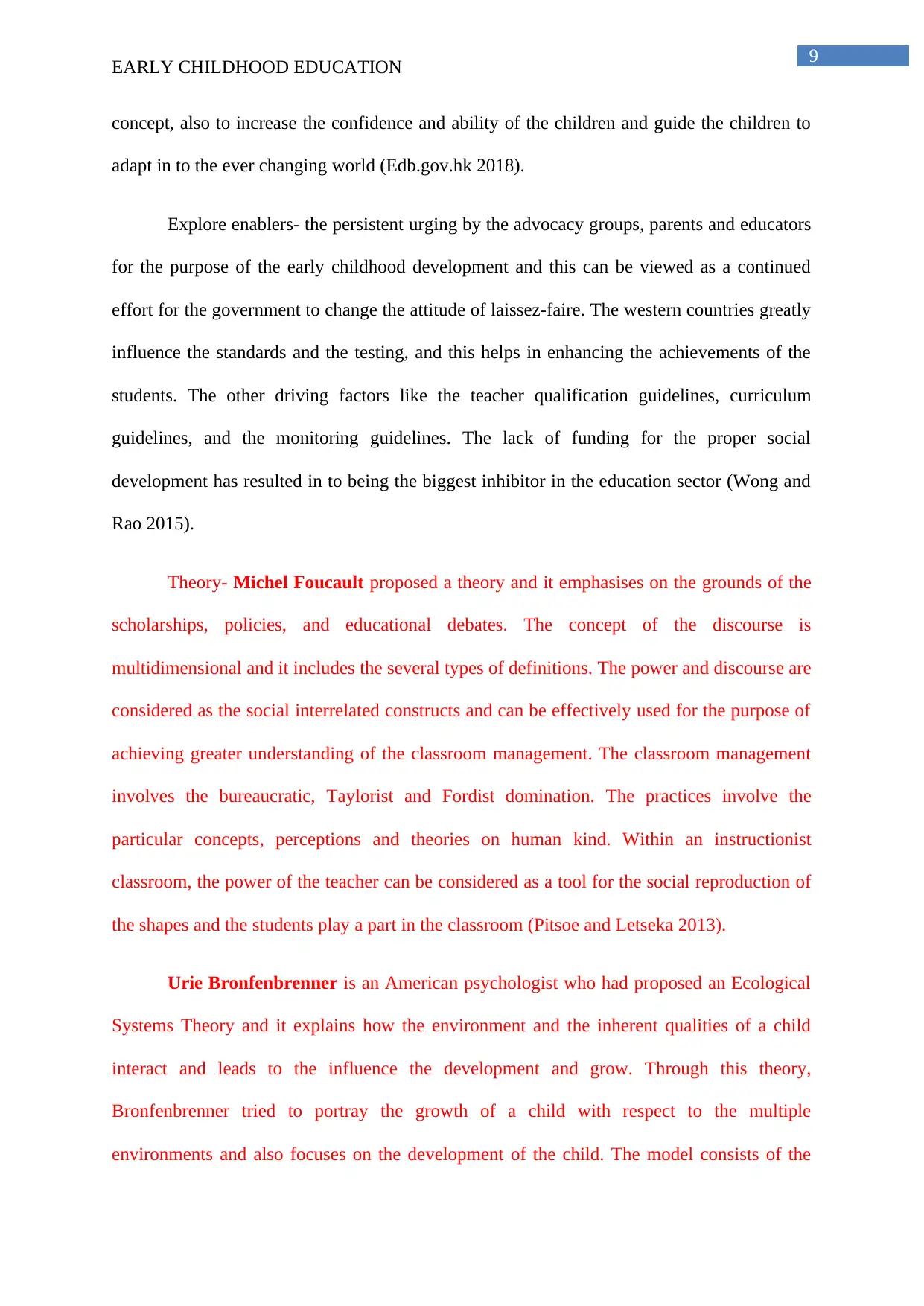
9
EARLY CHILDHOOD EDUCATION
concept, also to increase the confidence and ability of the children and guide the children to
adapt in to the ever changing world (Edb.gov.hk 2018).
Explore enablers- the persistent urging by the advocacy groups, parents and educators
for the purpose of the early childhood development and this can be viewed as a continued
effort for the government to change the attitude of laissez-faire. The western countries greatly
influence the standards and the testing, and this helps in enhancing the achievements of the
students. The other driving factors like the teacher qualification guidelines, curriculum
guidelines, and the monitoring guidelines. The lack of funding for the proper social
development has resulted in to being the biggest inhibitor in the education sector (Wong and
Rao 2015).
Theory- Michel Foucault proposed a theory and it emphasises on the grounds of the
scholarships, policies, and educational debates. The concept of the discourse is
multidimensional and it includes the several types of definitions. The power and discourse are
considered as the social interrelated constructs and can be effectively used for the purpose of
achieving greater understanding of the classroom management. The classroom management
involves the bureaucratic, Taylorist and Fordist domination. The practices involve the
particular concepts, perceptions and theories on human kind. Within an instructionist
classroom, the power of the teacher can be considered as a tool for the social reproduction of
the shapes and the students play a part in the classroom (Pitsoe and Letseka 2013).
Urie Bronfenbrenner is an American psychologist who had proposed an Ecological
Systems Theory and it explains how the environment and the inherent qualities of a child
interact and leads to the influence the development and grow. Through this theory,
Bronfenbrenner tried to portray the growth of a child with respect to the multiple
environments and also focuses on the development of the child. The model consists of the
EARLY CHILDHOOD EDUCATION
concept, also to increase the confidence and ability of the children and guide the children to
adapt in to the ever changing world (Edb.gov.hk 2018).
Explore enablers- the persistent urging by the advocacy groups, parents and educators
for the purpose of the early childhood development and this can be viewed as a continued
effort for the government to change the attitude of laissez-faire. The western countries greatly
influence the standards and the testing, and this helps in enhancing the achievements of the
students. The other driving factors like the teacher qualification guidelines, curriculum
guidelines, and the monitoring guidelines. The lack of funding for the proper social
development has resulted in to being the biggest inhibitor in the education sector (Wong and
Rao 2015).
Theory- Michel Foucault proposed a theory and it emphasises on the grounds of the
scholarships, policies, and educational debates. The concept of the discourse is
multidimensional and it includes the several types of definitions. The power and discourse are
considered as the social interrelated constructs and can be effectively used for the purpose of
achieving greater understanding of the classroom management. The classroom management
involves the bureaucratic, Taylorist and Fordist domination. The practices involve the
particular concepts, perceptions and theories on human kind. Within an instructionist
classroom, the power of the teacher can be considered as a tool for the social reproduction of
the shapes and the students play a part in the classroom (Pitsoe and Letseka 2013).
Urie Bronfenbrenner is an American psychologist who had proposed an Ecological
Systems Theory and it explains how the environment and the inherent qualities of a child
interact and leads to the influence the development and grow. Through this theory,
Bronfenbrenner tried to portray the growth of a child with respect to the multiple
environments and also focuses on the development of the child. The model consists of the
Paraphrase This Document
Need a fresh take? Get an instant paraphrase of this document with our AI Paraphraser
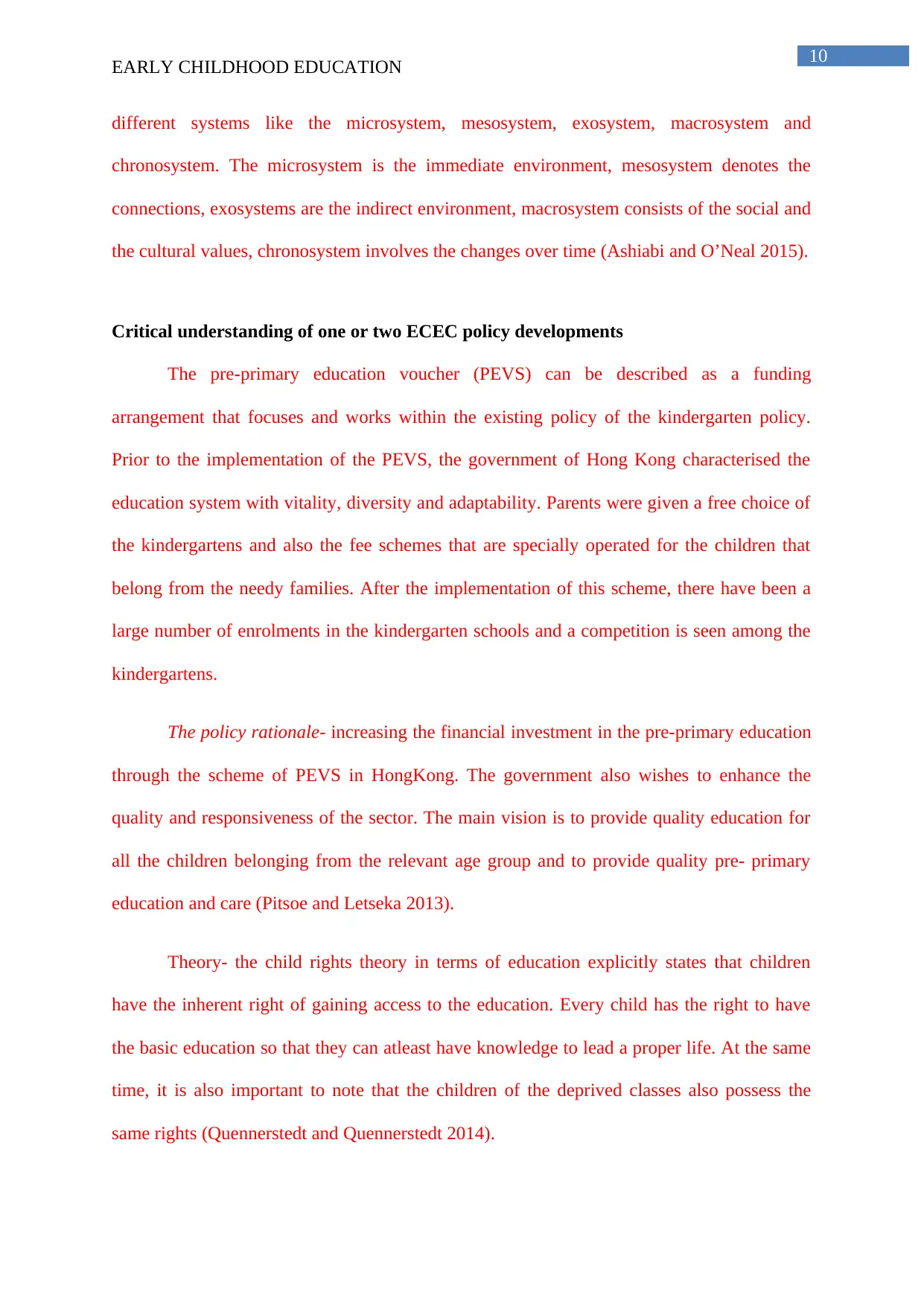
10
EARLY CHILDHOOD EDUCATION
different systems like the microsystem, mesosystem, exosystem, macrosystem and
chronosystem. The microsystem is the immediate environment, mesosystem denotes the
connections, exosystems are the indirect environment, macrosystem consists of the social and
the cultural values, chronosystem involves the changes over time (Ashiabi and O’Neal 2015).
Critical understanding of one or two ECEC policy developments
The pre-primary education voucher (PEVS) can be described as a funding
arrangement that focuses and works within the existing policy of the kindergarten policy.
Prior to the implementation of the PEVS, the government of Hong Kong characterised the
education system with vitality, diversity and adaptability. Parents were given a free choice of
the kindergartens and also the fee schemes that are specially operated for the children that
belong from the needy families. After the implementation of this scheme, there have been a
large number of enrolments in the kindergarten schools and a competition is seen among the
kindergartens.
The policy rationale- increasing the financial investment in the pre-primary education
through the scheme of PEVS in HongKong. The government also wishes to enhance the
quality and responsiveness of the sector. The main vision is to provide quality education for
all the children belonging from the relevant age group and to provide quality pre- primary
education and care (Pitsoe and Letseka 2013).
Theory- the child rights theory in terms of education explicitly states that children
have the inherent right of gaining access to the education. Every child has the right to have
the basic education so that they can atleast have knowledge to lead a proper life. At the same
time, it is also important to note that the children of the deprived classes also possess the
same rights (Quennerstedt and Quennerstedt 2014).
EARLY CHILDHOOD EDUCATION
different systems like the microsystem, mesosystem, exosystem, macrosystem and
chronosystem. The microsystem is the immediate environment, mesosystem denotes the
connections, exosystems are the indirect environment, macrosystem consists of the social and
the cultural values, chronosystem involves the changes over time (Ashiabi and O’Neal 2015).
Critical understanding of one or two ECEC policy developments
The pre-primary education voucher (PEVS) can be described as a funding
arrangement that focuses and works within the existing policy of the kindergarten policy.
Prior to the implementation of the PEVS, the government of Hong Kong characterised the
education system with vitality, diversity and adaptability. Parents were given a free choice of
the kindergartens and also the fee schemes that are specially operated for the children that
belong from the needy families. After the implementation of this scheme, there have been a
large number of enrolments in the kindergarten schools and a competition is seen among the
kindergartens.
The policy rationale- increasing the financial investment in the pre-primary education
through the scheme of PEVS in HongKong. The government also wishes to enhance the
quality and responsiveness of the sector. The main vision is to provide quality education for
all the children belonging from the relevant age group and to provide quality pre- primary
education and care (Pitsoe and Letseka 2013).
Theory- the child rights theory in terms of education explicitly states that children
have the inherent right of gaining access to the education. Every child has the right to have
the basic education so that they can atleast have knowledge to lead a proper life. At the same
time, it is also important to note that the children of the deprived classes also possess the
same rights (Quennerstedt and Quennerstedt 2014).
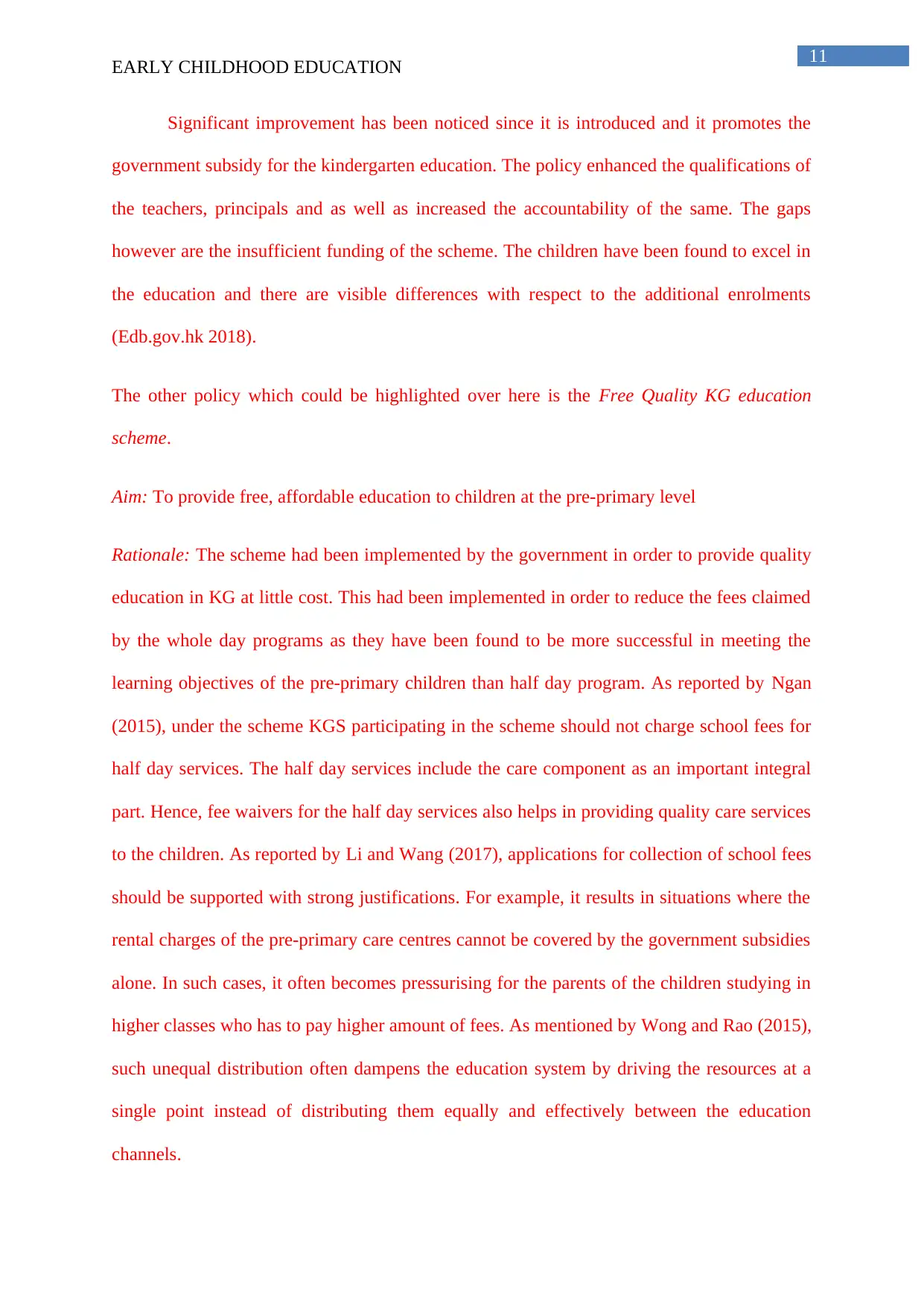
11
EARLY CHILDHOOD EDUCATION
Significant improvement has been noticed since it is introduced and it promotes the
government subsidy for the kindergarten education. The policy enhanced the qualifications of
the teachers, principals and as well as increased the accountability of the same. The gaps
however are the insufficient funding of the scheme. The children have been found to excel in
the education and there are visible differences with respect to the additional enrolments
(Edb.gov.hk 2018).
The other policy which could be highlighted over here is the Free Quality KG education
scheme.
Aim: To provide free, affordable education to children at the pre-primary level
Rationale: The scheme had been implemented by the government in order to provide quality
education in KG at little cost. This had been implemented in order to reduce the fees claimed
by the whole day programs as they have been found to be more successful in meeting the
learning objectives of the pre-primary children than half day program. As reported by Ngan
(2015), under the scheme KGS participating in the scheme should not charge school fees for
half day services. The half day services include the care component as an important integral
part. Hence, fee waivers for the half day services also helps in providing quality care services
to the children. As reported by Li and Wang (2017), applications for collection of school fees
should be supported with strong justifications. For example, it results in situations where the
rental charges of the pre-primary care centres cannot be covered by the government subsidies
alone. In such cases, it often becomes pressurising for the parents of the children studying in
higher classes who has to pay higher amount of fees. As mentioned by Wong and Rao (2015),
such unequal distribution often dampens the education system by driving the resources at a
single point instead of distributing them equally and effectively between the education
channels.
EARLY CHILDHOOD EDUCATION
Significant improvement has been noticed since it is introduced and it promotes the
government subsidy for the kindergarten education. The policy enhanced the qualifications of
the teachers, principals and as well as increased the accountability of the same. The gaps
however are the insufficient funding of the scheme. The children have been found to excel in
the education and there are visible differences with respect to the additional enrolments
(Edb.gov.hk 2018).
The other policy which could be highlighted over here is the Free Quality KG education
scheme.
Aim: To provide free, affordable education to children at the pre-primary level
Rationale: The scheme had been implemented by the government in order to provide quality
education in KG at little cost. This had been implemented in order to reduce the fees claimed
by the whole day programs as they have been found to be more successful in meeting the
learning objectives of the pre-primary children than half day program. As reported by Ngan
(2015), under the scheme KGS participating in the scheme should not charge school fees for
half day services. The half day services include the care component as an important integral
part. Hence, fee waivers for the half day services also helps in providing quality care services
to the children. As reported by Li and Wang (2017), applications for collection of school fees
should be supported with strong justifications. For example, it results in situations where the
rental charges of the pre-primary care centres cannot be covered by the government subsidies
alone. In such cases, it often becomes pressurising for the parents of the children studying in
higher classes who has to pay higher amount of fees. As mentioned by Wong and Rao (2015),
such unequal distribution often dampens the education system by driving the resources at a
single point instead of distributing them equally and effectively between the education
channels.
⊘ This is a preview!⊘
Do you want full access?
Subscribe today to unlock all pages.

Trusted by 1+ million students worldwide
1 out of 19
Related Documents
Your All-in-One AI-Powered Toolkit for Academic Success.
+13062052269
info@desklib.com
Available 24*7 on WhatsApp / Email
![[object Object]](/_next/static/media/star-bottom.7253800d.svg)
Unlock your academic potential
Copyright © 2020–2026 A2Z Services. All Rights Reserved. Developed and managed by ZUCOL.





